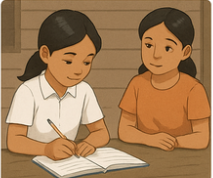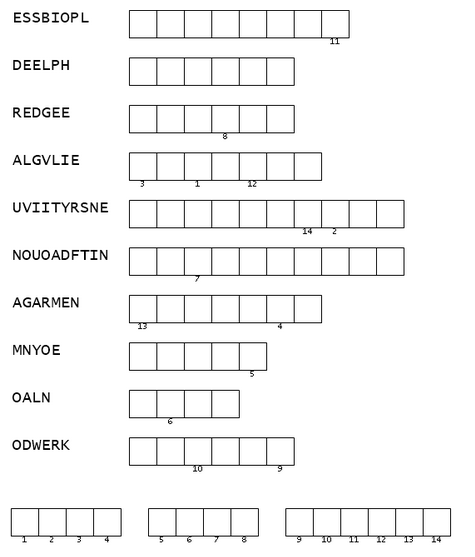- life after school

Sophea is ten years old. She lives in a village in Cambodia. After school, she walks home. At home, she takes off her shoes and says hello to her family.

She changes her clothes and washes her hands and face. Then she takes her school bag and opens her books. Sophea sits at the table or outside near the house. She does her homework. She writes and reads. Sometimes she asks her cousin or aunt for help.

After homework, she puts her books back in her bag. Then she helps at home. She waters the plants or plays with her little brother. In the evening, she eats dinner with her family.

—————————————
Vocabulary:
- A village: A small place where people live.
- To take off shoes: To remove your shoes.
- To change clothes: To put on new clothes.
- School bag: A bag for books and school things.
- A cousin: The child of your uncle or aunt.
- To water plants: To give water to plants.
- Dinner: The meal you eat in the evening.
#################
True, false?
- Sophea is ten years old.
- Sophea lives in a city in Cambodia.
- After school, Sophea takes a bus home.
- Sophea takes off her shoes when she gets home.
- Sophea eats lunch with her family in the evening.
- Sophea does her homework outside near the house.
- Sophea asks her cousin or aunt for help with homework.
- Sophea has a sister who helps her with homework.
- Sophea waters the plants after homework.
- Sophea plays with her little brother in the evening.
————————————
- Sophea is ten years old.
- Sophea lives in a city in Cambodia.
- After school, Sophea takes a bus home.
- Sophea takes off her shoes when she gets home.
- Sophea eats lunch with her family in the evening.
- Sophea does her homework outside near the house.
- Sophea asks her cousin or aunt for help with homework.
- Sophea has a sister who helps her with homework.
- Sophea waters the plants after homework.
- Sophea plays with her little brother in the evening.
______________________
True: 1,4,6,7,9,10
#########################
Ooooops, something went wrong, find the correct definitions:
- A village –
a. A bag for school things - To take off shoes –
b. A small place where people live - To change clothes –
c. To remove your shoes from your feet - School bag –
d. To put on new clothes - A cousin –
e. The meal you eat in the evening - To water plants –
f. To give plants water - Dinner –
g. The child of your uncle or aunt - A home –
h. To clean your hands with water and soap - To wash hands –
i. A place where you live with your family - To read –
j. To look at words and understand them
_____________________
Answers:
A village – b. A small place where people live
To take off shoes – c. To remove your shoes from your feet
To change clothes – d. To put on new clothes
School bag – a. A bag for school things
A cousin – g. The child of your uncle or aunt
To water plants – f. To give plants water
Dinner – e. The meal you eat in the evening
A home – i. A place where you live with your family
To wash hands – h. To clean your hands with water and soap
To read – j. To look at words and understand them
#####################
Answer these questions (have a look at present simple first):
- How old is Sophea?
- Where does Sophea live?
- What does Sophea do after school?
- What does Sophea do when she gets home?
- Who does Sophea say hello to when she gets home?
- What does Sophea do after changing her clothes?
- Where does Sophea do her homework?
- Who helps Sophea with her homework?
- What does Sophea do after finishing her homework?
- What does Sophea do in the evening?
————————–
Answers
a. She takes off her shoes and says hello to her family.
b. She puts her books back in her bag and helps at home.
c. She lives in a village in Cambodia.
d. She eats dinner with her family.
e. She is ten years old.
f. Sometimes her cousin or aunt helps her.
g. She does her homework at the table or outside near the house.
h. She washes her hands and face.
i. She walks home.
j. She says hello to her family.
__________________________________
Answers:
- How old is Sophea? – e. She is ten years old.
- Where does Sophea live? – c. She lives in a village in Cambodia.
- What does Sophea do after school? – i. She walks home.
- What does Sophea do when she gets home? – a. She takes off her shoes and says hello to her family.
- Who does Sophea say hello to when she gets home? – j. She says hello to her family.
- What does Sophea do after changing her clothes? – h. She washes her hands and face.
- Where does Sophea do her homework? – g. She does her homework at the table or outside near the house.
- Who helps Sophea with her homework? – f. Sometimes her cousin or aunt helps her.
- What does Sophea do after finishing her homework? – b. She puts her books back in her bag and helps at home.
- What does Sophea do in the evening? – d. She eats dinner with her family.
###################
Ooooops, what is the correct sentence?
- after home school Sophea walks
- her She takes shoes.off
- her Sophea clothes at changes home
- does outside homework her She
- the Sophea plants water helps
- with dinner She eats family.
———————
- Sophea walks home after school.
- She takes off her shoes.
- Sophea changes her clothes at home.
- She does her homework outside.
- Sophea helps water the plants.
- She eats dinner with family.
######################
Interview with Sophea
(Link – how to form questions in present simple)
1. What is your name?
My name is Sophea.
2. How old are you?
I am ten years old.
3. Where do you live?
I live in a village.
4. What do you do after school?
I walk home after school.
5. Who helps you with your homework?
My cousin or aunt helps me.
6. What do you do in the evening?
I eat dinner with my family.
Interview with Oum about Sophea
1. Do you know Sophea?
Yes, she is my friend.
2. How old is Sophea?
She is ten years old.
3. Where does Sophea live?
She lives in a village.
4. What does Sophea do after school?
She walks home.
5. Does Sophea do her homework?
Yes, she does her homework.
6. Who helps Sophea at home?
Her cousin or aunt helps her.
#######################
Form questions to which the words underlined are the answer
(Link – how to form questions in present simple)
1. She puts her books back in her bag.
a) She
b) her books
c) in her bag
2) Sophea sits at the table out in the garden.
a) Sophea
b) at the table out in the garden
3) She plays in the garden in the evening.
a) She
b) plays
c) in the garden
d) in the evening
————————–
Answers:
Who puts her books back?
What does she put back?
Where does she put her books?
Who sits at the table out in the garden?
Where does Sophea sit?
Who plays in the garden in the evening?
What does she do in the garden?
Where does she play?
When does she play in the garden?
###################
Fill in, complete:
She eats ___________with her family.
Sophea is ten __________old.
She lives in a small ___________.
She walks home after her _____________.
She __________ her shoes.
She says hello to her __________.
She changes clothes and ___________her face.
She does her homework __________.
Her ___________ or aunt helps her.
She __________the plants at home.
———————————–
Answers:
- She eats dinner with her family.
- Sophea is ten years old.
- She lives in a small village.
- She walks home after her school.
- She takes off her shoes.
- She says hello to her family.
- She changes clothes and washes her face.
- She does her homework at the table or outside near the house.
- Her cousin or aunt helps her.
- She waters the plants at home.
###########################
REWRITE THE STORY – follow instructions below:
Sophea is ten years old.
She lives in a village in Cambodia.
After school, she walks home.
At home, she takes off her shoes and says hello to her family.
She eats dinner with her family.
Sophea is ten years old.
She lives in a small village.
She walks home after her school.
She takes off her shoes.
She says hello to her family.
She changes clothes and washes her face.
She does her homework at the table or outside near the house.
Her cousin or aunt helps her.
She changes her clothes and washes her hands and face.
Then she takes her school bag and opens her books.
Sophea sits at the table or outside near the house.
She does her homework. She writes and reads.
Sometimes she asks her cousin or aunt for help.
After homework, she puts her books back in her bag.
Then she helps at home.
She waters the plants or plays with her little brother.
In the evening, she eats dinner with her family.
—————————
>>>>>>>YOU ARE SOPHEA;
>>>>>>>YOU TELL YOUR STORY –
>>>>>>>make all changes necessary:
I am ten years old.
I live in a village in Cambodia.
After School, I walk……………………..
________________________________
Correct version:
I am ten years old.
I live in a village in Cambodia.
After school, I walk home.
At home, I take off my shoes and say hello to my family.
I change my clothes and wash my hands and face.
Then I take my school bag and open my books.
I sit at the table or outside near the house.
I do my homework.
I write and read.
Sometimes I ask my cousin or aunt for help.
After homework, I put my books back in my bag.
Then I help at home.
I water the plants or play with my little brother.
In the evening, I eat dinner with my family.
a speedy version:




